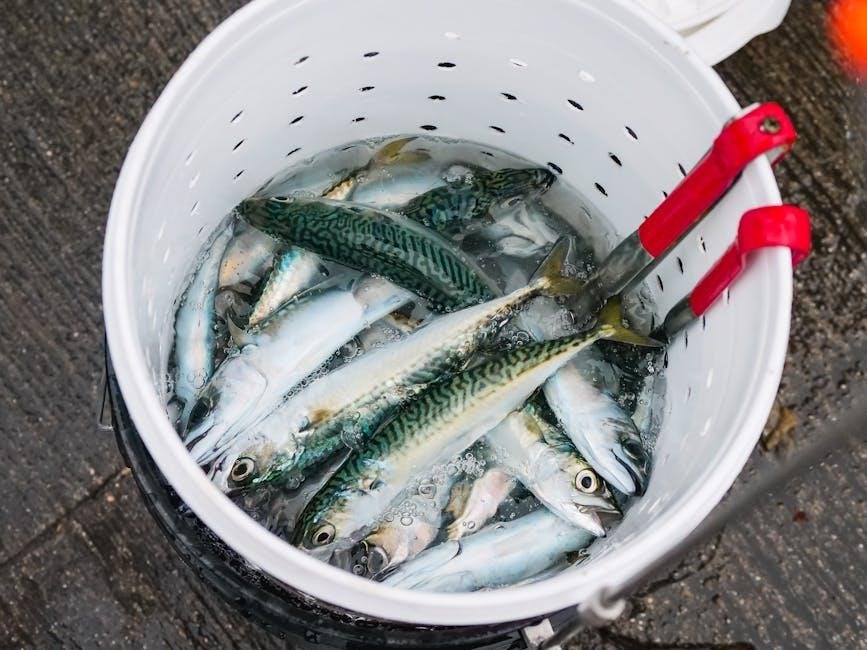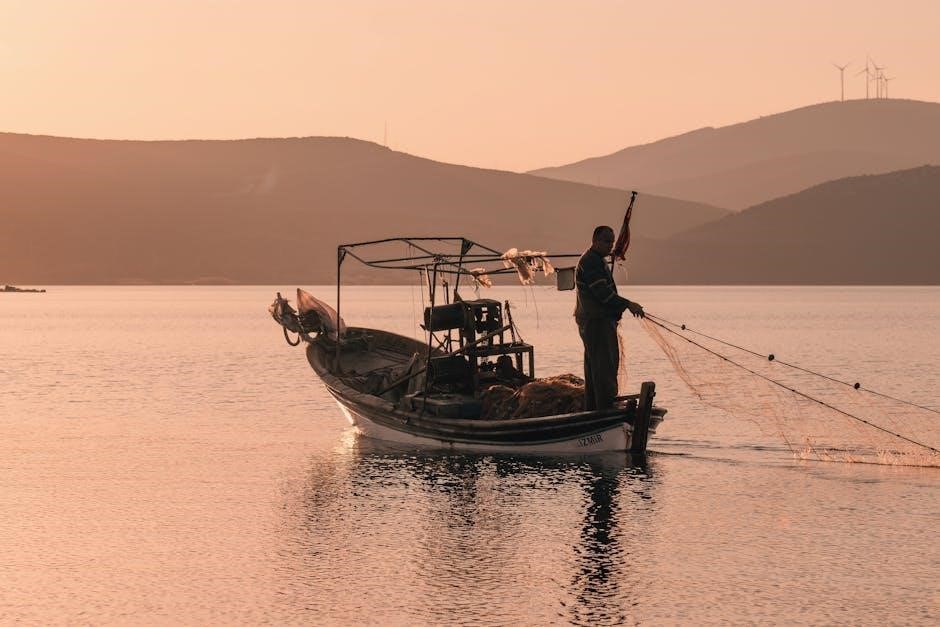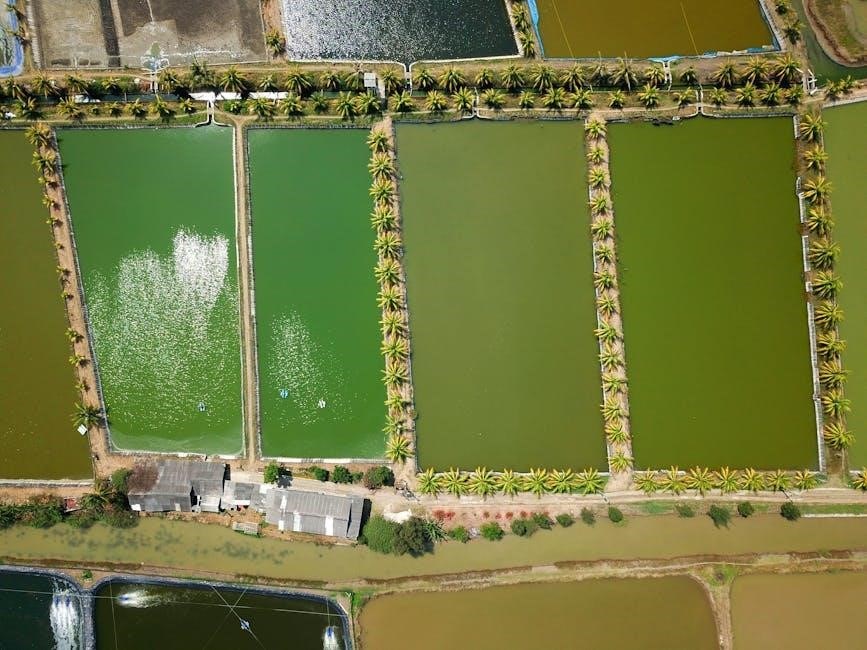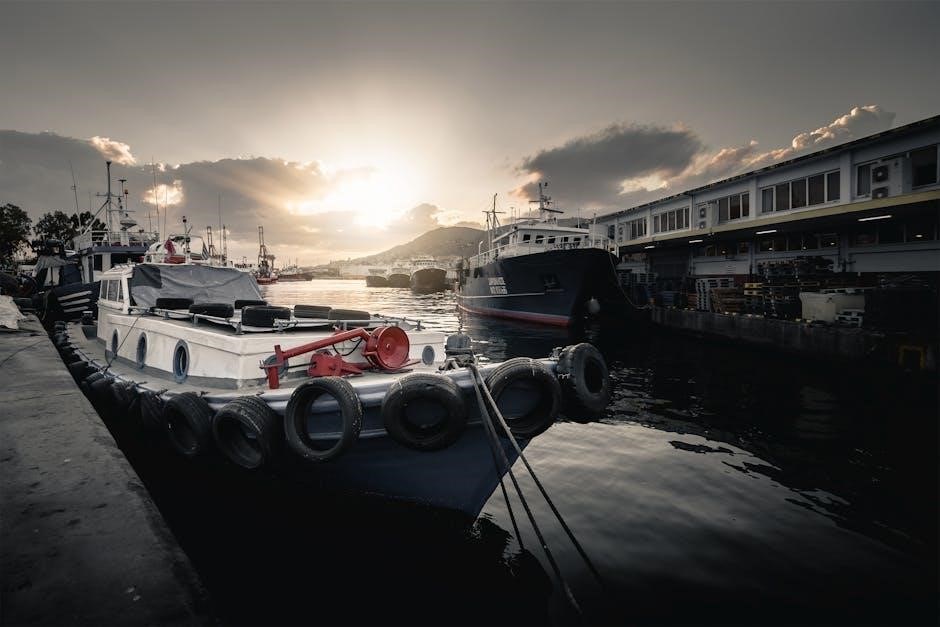
Fisheries is an essential industry and field of study, focusing on the catching, processing, and selling of fish and aquatic organisms․ It plays a crucial role in food production, livelihoods, and ecological sustainability, managed through fisheries science and sustainable practices․
Definition and Scope of Fisheries
Fisheries refer to the collective activities, industries, and sciences related to the catching, processing, and selling of fish and other aquatic organisms․ This encompasses both marine and freshwater environments, including commercial and recreational fishing․ The scope of fisheries extends beyond food production, contributing to livelihoods, cultural practices, and economic stability, particularly in coastal and riparian communities․ Fisheries science focuses on understanding fish biology, population dynamics, and ecosystem interactions to ensure sustainable practices; The industry also involves aquaculture, sport fishing, and ornamental fish culture, making it a diverse and complex field․ Effective fisheries management balances ecological conservation, social benefits, and economic viability to maintain healthy aquatic resources for future generations․
Historical Development of Fisheries
The history of fisheries dates back thousands of years, with early humans relying on fishing for food and sustenance․ Ancient civilizations developed primitive yet effective fishing techniques, using nets, lines, and hooks made from natural materials․ As societies evolved, so did fishing practices, with advancements in boat design and gear leading to more efficient harvesting; The Middle Ages saw the rise of commercial fisheries, particularly in Europe, where cod and herring became staple commodities․ The Industrial Revolution brought mechanized fishing, enabling larger catches and global distribution․ In the 20th century, concerns over overfishing led to the development of fisheries management and sustainability practices․ Today, fisheries continue to adapt, balancing tradition with modern innovations to ensure their longevity․
Ecological Importance of Fisheries
Fisheries are vital to marine and freshwater ecosystems, providing food and habitat for diverse species․ They support biodiversity, nutrient cycling, and carbon sequestration, while maintaining ecological balance and shoreline protection․

Biodiversity in Marine and Freshwater Ecosystems
Marine and freshwater ecosystems supported by fisheries host a vast array of species, from fish and shellfish to plankton and algae․ These ecosystems provide critical habitats for both commercial and non-commercial species, ensuring ecological balance․ Fisheries play a vital role in maintaining biodiversity by supporting food webs and nutrient cycles․ However, overfishing and habitat degradation threaten this diversity, impacting predator and prey relationships․ Freshwater systems, such as rivers and lakes, also contribute to biodiversity, with fish serving as indicators of ecosystem health․ Protecting these habitats is essential to preserve species variety and ensure the sustainability of aquatic life for future generations․
Ecosystem Services Provided by Fisheries
Fisheries contribute significantly to ecosystem services, including nutrient cycling, carbon sequestration, and shoreline stabilization․ These services support marine and freshwater ecosystems, ensuring water quality and habitat diversity․ Fisheries also play a role in maintaining ecological balance by controlling prey populations and supporting food webs․ Additionally, they provide coastal protection through mangroves and coral reefs, which are often linked to fishing activities․ These services are vital for both environmental health and human well-being, offering benefits like clean water and recreational opportunities․ However, unsustainable practices can disrupt these services, highlighting the need for balanced management to preserve these ecological benefits while meeting human demands․
Role of Fisheries in Food Security
Fisheries play a vital role in ensuring global food security by providing a rich source of protein for millions of people․ They are particularly crucial in developing countries, where fish is often a primary dietary staple․ Fisheries contribute to food availability, access, and utilization, offering affordable nutrition to diverse populations․ Additionally, they support livelihoods, enabling communities to purchase other essential foods․ Overfishing and climate change pose challenges to this role, highlighting the need for sustainable management․ Effective fisheries management ensures consistent food supplies, helping to combat malnutrition and support economic stability․ Thus, fisheries are indispensable in addressing global food security challenges․

Economic Importance of Fisheries
Challenges in Fisheries Management
Fisheries face challenges like overfishing, habitat degradation, and climate change, requiring sustainable practices and robust management frameworks to ensure long-term ecological and economic stability․

Commercial Value and Livelihoods

Fisheries hold significant commercial value, contributing to national economies through fish production, processing, and export․ They provide livelihoods for millions globally, supporting communities through direct employment in fishing, processing, and marketing․ Additionally, fisheries foster indirect jobs in tourism, manufacturing, and trade, making them a cornerstone of economic stability in many regions․ The industry also plays a cultural role, with fishing often being a traditional occupation passed down through generations․ Ensuring sustainable practices is crucial to maintaining these economic benefits and supporting the well-being of dependent populations․ Fisheries are not just an economic asset but a vital part of societal fabric, especially in coastal areas․
Fisheries as a Global Industry
The fisheries sector is a vast and interconnected global industry, spanning every ocean and major water body․ It contributes significantly to the international economy, with millions of people employed in fishing, processing, and trade․ The industry is valued for its high-volume exports and imports, impacting the GDP of both developed and developing nations․ Global fisheries play a critical role in food security, with marine and freshwater products traded widely․ However, challenges like overfishing and habitat degradation threaten sustainability․ International agreements and organizations work to regulate practices, promoting eco-labeling and responsible fishing․ As global demand grows, innovation and cooperation are essential to ensure the industry’s long-term viability and environmental health․

Management and Sustainability in Fisheries
Sustainable fisheries practices focus on balancing ecological conservation with economic and social needs, ensuring long-term benefits for both ecosystems and communities․

Fisheries management faces numerous challenges, including overfishing, habitat degradation, and climate change, which threaten fish populations and ecosystems․ Illegal, unreported, and unregulated fishing practices compound these issues, undermining sustainability efforts․ Additionally, the complexity of managing transboundary fish stocks and balancing the needs of various stakeholders, such as commercial and artisanal fishers, presents significant difficulties․ Climate change further exacerbates these challenges by altering fish distributions and ecosystem dynamics․ Effective management requires robust enforcement, adaptive policies, and international cooperation to ensure the long-term health of fisheries and the communities that depend on them․ Addressing these challenges is critical for achieving sustainable biological, social, and economic outcomes․
Sustainable Practices and Policies
Sustainable fisheries management relies on implementing practices and policies that balance ecological health with economic and social needs․ Key strategies include establishing marine protected areas, enforcing catch limits, and promoting eco-certification of fisheries․ Policies such as the Common Fisheries Policy and the Sustainable Fisheries Act aim to prevent overfishing and protect habitats․ Additionally, measures like gear restrictions and monitoring systems help reduce bycatch and discarding․ International cooperation through frameworks like the Food and Agriculture Organization (FAO)’s Code of Conduct for Responsible Fisheries ensures global alignment․ These efforts are critical to maintaining biodiversity, ensuring food security, and supporting livelihoods while safeguarding aquatic ecosystems for future generations․
Future of Fisheries
The future of fisheries thrives on sustainable practices, innovative technologies, and global collaboration․ Advances in aquaculture, eco-friendly gear, and policy frameworks will ensure long-term ecological and economic stability․
Innovations and Technological Advancements
The future of fisheries is being shaped by cutting-edge innovations and technologies․ Aquaculture advancements, such as recirculating aquaculture systems (RAS), are improving fish farming efficiency and sustainability․ Artificial intelligence (AI) and IoT devices are enhancing monitoring and management of fish stocks․ Eco-friendly fishing gear, like biodegradable nets, reduces environmental impact․ Blockchain technology is increasing transparency in seafood supply chains․ Additionally, marine protected areas and catch-and-release systems are being optimized to preserve biodiversity․ These innovations aim to balance productivity with ecological health, ensuring fisheries remain a viable resource for generations․
Global Collaboration and Policy Frameworks
Global collaboration is essential for addressing the challenges facing fisheries․ International agreements, such as the United Nations Fish Stocks Agreement, promote sustainable fishing practices․ Regional fisheries management organizations work to enforce quotas and protect vulnerable species․ National policies, like the EU’s Common Fisheries Policy, aim to balance economic and environmental goals․ Non-governmental organizations also play a crucial role in advocating for sustainable practices․ By fostering cooperation and aligning policies, the global community can ensure the long-term health of marine ecosystems and the industries they support․ Collaboration is key to achieving sustainable fisheries management worldwide․